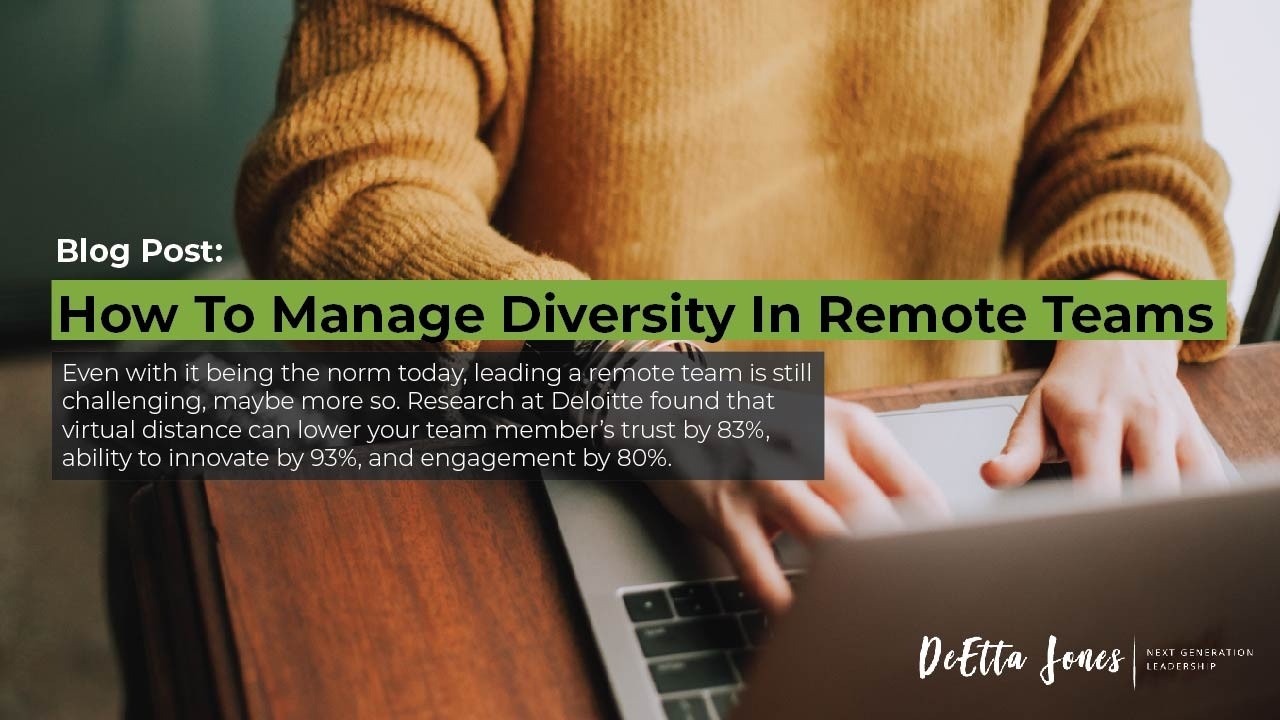Like so many managers in today's new global environment, you've been tasked with the responsibility of leading a team of employees—many of whom report to you from multiple locations. Congratulations! You're a manager, you have one of the toughest jobs in the company…
Even with it being the norm today, leading a remote team is still challenging, maybe more so. Research at Deloitte found that virtual distance can lower your team member’s trust by 83%, ability to innovate by 93%, and engagement by 80%.
As a manager you're expected to maintain morale, keep communication open, overcome technological glitches, keep your workers on task, meet project deadlines and manage diversity.
Let's talk about managing diversity
With increased revenues by almost 20%, the good news is diverse teams financially out-perform more homogeneous organizations. We tend to think, communicate and make decisions based on our backgrounds. And, when everyone on a team operates with the same norms, perceptions, and values, interacting with others and doing business is relatively straightforward. But things get more complicated when we're managing a diverse team, something that is an obvious reality in today's global workforce.
Gender Differences
Socialization, expectations in communication, and true differences in the way diverse genders think and feel, can impact individual and team effectiveness. According to research at Catalyst, it’s even more difficult for those who identify as women or non-binary. 1 in 5 women felt ignored and overlooked by coworkers using video calls for meetings. 45% of women business leaders say it’s difficult for women to speak up in virtual meetings and even 42% of male business leaders agree.
Additionally, in a survey by the Society of Women Engineers, 31% of women and non-binary respondents reported “getting talked over, interrupted, or ignored more frequently during virtual meetings than those held in person”
Those who identify as women or those with more feminine energy appreciate a sense of community in a team. Collaborating, connecting, and reaching consensus on roles and responsibilities, project work deliverables, and celebrating successes will all be direct motivators.
By contrast, men, and those with more masculine energy, may feel engaged and committed to team efforts, as long as, they receive praise for their own successes. Research shows that those with more masculine energy seek first and foremost to be seen as powerful and influential, and therefore individual achievements are direct motivators.
Cultural Differences
Ingrid was nervous because Deepti was late to their meeting. She wanted to discuss her concerns about the current project. Deadlines have been missed (moved up or pushed back) and deliverables, while still high quality, are not exactly what was expected.
Deepti didn’t understand why Ingrid was upset, the team had come in early on a few deliverables, and had found some excellent innovative solutions outside what was expected. She was pleased how the engineers took initiative – in fact, she was finishing up a team meeting giving them kudos right now…
Sound familiar? We are all shaped by the cultures in which we have been socialized in. However, while we make choices and decisions based on our culture, people evaluate our actions based on their cultures. Often, we aren't even aware of this fact--and can be brought up short by cultural misunderstandings.
How an individual manages time, approaches a project, builds relationships, are all driven by cultural context – meaning you’ll see the same thing throughout a particular group, society and country.
What we don’t realize is how strongly culture influences the way someone shows up at work. Understanding this is critical to efficient and effective teamwork. And again, they may not be as visible when working remote. We need to mine for them.
Three Tactics for Managing Diversity in Remote Teams
By now you may be wondering how to go forward. If you feel like this, you aren't alone. 89% of global employees work remotely at least part of the time and 9 out of 10 want to continue to work remotely. Managers must get this right—here are three tactics you can employ to manage diversity in a remote team successfully:
Create context for your team. When your employees understand the context or what, why, and who, in terms of background and experience, they are more apt to buy into the overall mission and the individual deliverables for which they are responsible. Creating context helps people from diverse backgrounds see the commonality in directive, which can go a long way toward building bridges across gender and culture or, for that matter, differences in opinions.
Build a strong culture. For remote workers, it can be particularly difficult to feel a part of something. Various data shows that meeting face-to-face during a project will increase productivity by 50 percent. Building a strong culture and a sense of community around the culture, can take many forms--intentionally connecting via email, video, or phone, and doing that more often per week, even if it's only to chit-chat for 5-15 minutes is a game-changer.
Where possible, encourage your team members to go into the local office one day a week to network. Meeting with colleagues can help increase a feeling of community. You may need to create a buddy system for those where a physical office isn’t accessible.
Another option in culture-building, is to create and send remote employees a swag-kit so that they can have the same visuals and things around their work desks as a constant reminder they are part of the team.
Co-share leadership. As a manager, sharing leadership responsibility is one of the best strategies to involve team members. Each person should be empowered to take the lead in a team meeting, take charge of a piece of a project, and be accountable for specific results in their area of expertise. In a leadership role, team members will participate more, be more visible, and take more ownership for overall outcomes.
Diverse remote teams are not going anywhere. As a manager, the best thing you can do is to acknowledge and manage to individual interests, expectations and strengths. It’s doable, but it takes knowledge and practice.
Learn more about our CultureRoad™ Training and Development, an online learning platform that offers the blueprint for distinguishing oneself, building effective teams and strategically navigating the toughest leadership challenges.

Melissa Lamson, M.A.
Leadership & Organizational Development Consultant, Certified Coach, Diversity Expert, Licensed Insights Practitioner
Melissa has built and run companies both in Europe and the US. She has partnered with successful leaders and companies across all industries around the world. Her leadership programs are used at Accenture, IKEA,Linkedin, MTV, Porsche, Ripple, SAP, Space X, Unity Point Health, WalkMe and many other firms. She has served as interim Head of Global Diversity. Melissa has her Masters in intercultural relations, specializing in diversity management, and has authored six books with global leadership and DEI subject

